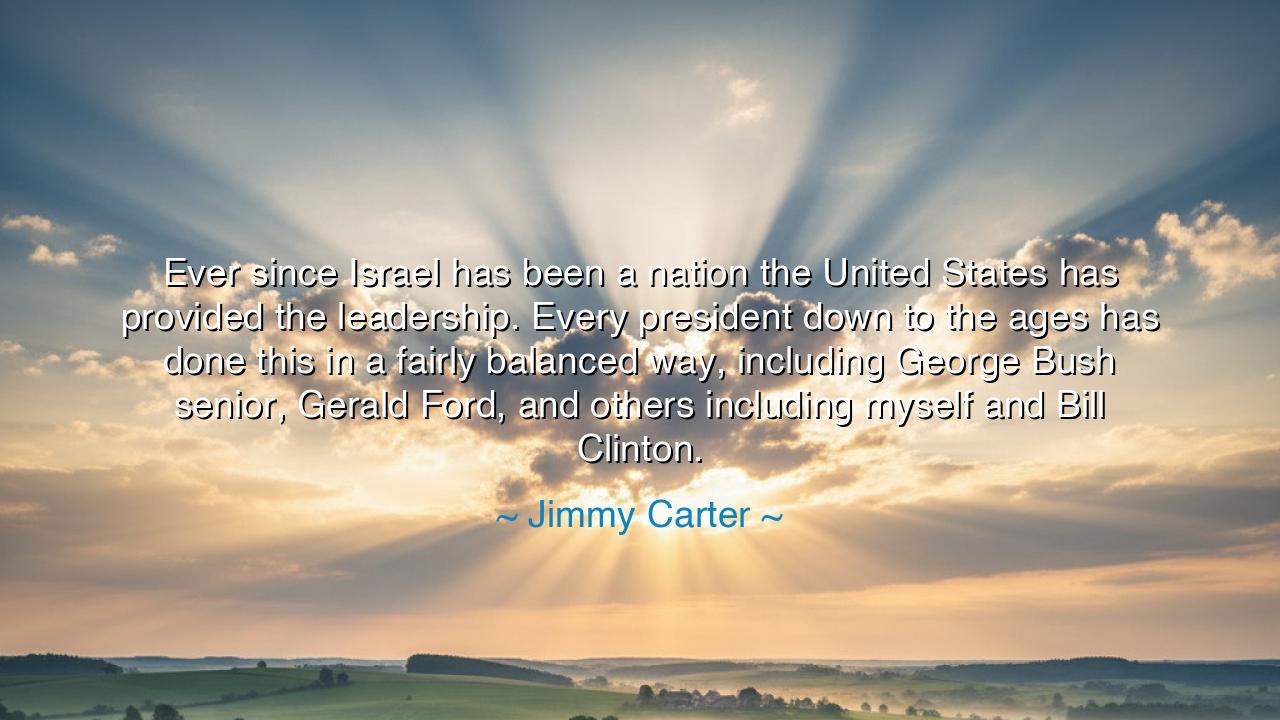
Ever since Israel has been a nation the United States has
Ever since Israel has been a nation the United States has provided the leadership. Every president down to the ages has done this in a fairly balanced way, including George Bush senior, Gerald Ford, and others including myself and Bill Clinton.






"Ever since Israel has been a nation the United States has provided the leadership. Every president down to the ages has done this in a fairly balanced way, including George Bush senior, Gerald Ford, and others including myself and Bill Clinton." Thus spoke Jimmy Carter, the former President of the United States, a man of humble origins yet mighty deeds, whose years in office were marked by a deep pursuit of peace. His words are not boastful but reflective, pointing to the long thread of history where one nation, the United States, has carried the weight of leadership in guiding the fragile destiny of the Middle East, especially in its relationship with the young and embattled state of Israel.
The meaning of his statement is rooted in the bond between America and Israel, a bond forged not only in politics but in faith, history, and shared ideals. Carter declares that since the very birth of Israel in 1948, the United States has stood as a guardian, a mediator, and at times a shield. Each president, he insists, carried this burden in his own way, striving for balance, knowing that the road of leadership in this region was fraught with peril, for it touched upon ancient rivalries, sacred lands, and the cries of both justice and vengeance.
Carter’s own role in this saga shines as a beacon. In 1978, at Camp David, he brought together two bitter enemies: Anwar Sadat of Egypt and Menachem Begin of Israel. For thirteen days he labored, prayed, and reasoned, refusing to let the talks collapse. In the end, the Camp David Accords were signed, bringing peace between Egypt and Israel after decades of bloodshed. This was leadership not of armies but of spirit—of patience, humility, and relentless hope. It remains one of the greatest examples of American diplomacy, proving Carter’s words true: that the United States had indeed provided leadership, and in his case, a leadership aimed at reconciliation.
History also shows that such leadership was not without struggle. Leaders like Gerald Ford and George H. W. Bush had to balance the twin commitments of supporting Israel’s security while also recognizing the suffering of the Palestinian people. To fail in balance was to risk inflaming the fires of hatred; to succeed was to keep alive the fragile dream of peace. Carter’s mention of "balance" reveals his belief that true leadership does not choose sides blindly but seeks to hold justice in both hands, even when the world shouts for partisanship.
The origin of this quote is not in the halls of theory but in the living arena of geopolitics. Carter spoke from the vantage point of a man who had stood at the crossroads of history, who knew the weight of decisions that shaped lives across nations. He had seen firsthand that the mantle of leadership is both blessing and burden: blessing, because it allows one to guide toward peace; burden, because the eyes of nations rest upon you, and failure brings suffering to millions.
The lesson for us is clear: true leadership is not mere authority, nor is it blind loyalty to one side at the expense of another. It is the ability to balance, to mediate, to see beyond the cries of vengeance into the vision of peace. It is the courage to sit enemies at one table and refuse to let them rise until understanding is reached. It is the humility to recognize that leadership is service, not domination.
Practical action follows. In our own lives, we too must learn to be mediators, not merely partisans. In family disputes, in communities divided, in workplaces torn by rivalry—choose the harder path of balance. Listen to both sides, hold fairness in your heart, and labor for reconciliation. Do not seek victory for one, but healing for all. And if you are entrusted with leadership, let Carter’s words guide you: do not wield power as a sword, but as a bridge.
So I say to you, children of tomorrow: remember the witness of Jimmy Carter. Nations are healed not by those who choose sides, but by those who lead with balance and with vision. Let your leadership be like his at Camp David—patient, courageous, and rooted in hope. For such leadership redeems not only nations but the soul of humanity itself.






AAdministratorAdministrator
Welcome, honored guests. Please leave a comment, we will respond soon